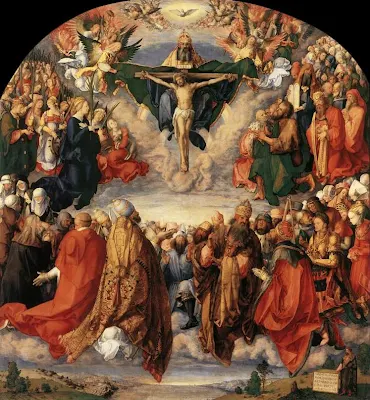From the Breviary according to the use of the Roman Curia, 1529, the conclusion of a Carolingian homily commonly read on the feast of All Saints in the Middle Ages.
Therefore, dearest brethren, with the full intention of our minds let us ask for the protection of the mighty intercessors of whom we have spoken, so that through the temporal feast which we keep, by their merits intereceding, we may be able to come to eternal joy. All things pass away that are celebrated in time. Take care, all that take part in these solemnities, lest you be cut off from the eternal solemnity. For what profiteth it to take part in the feasts of men, if it befall you to miss the feasts of the Angels?
(The second part, from "All things pass away..." to the end, is added from a homily of Saint Gregory of Great for the Octave Day of Easter.)

From the Breviary of St. Pius V, 1568, the end of the treatise on mortality by St. Cyprian of Carthage, bishop and martyr, read on the Octave Day of All Saints.
We must consider, most beloved brethren, and continually reflect upon the fact that we have renounced the world, and in the meanwhile live here as guests and pilgrims. Let us embrace the day which assigns each of us to his own home, which restores us to paradise and the heavenly kingdom, delivered hence and freed from the snares of the world. What man that has been placed in foreign lands would not hasten to return to his own country? What man that is hastening to sail back to his friends desireth not the more eagerly a prosperous wind, that he might the sooner be able to embrace those dear to him? We regard paradise as our country, already we begin to deem the patriarchs as our parents: why do we not hasten and run, that we may see our country, that we may greet our parents? There a great number of our dear ones awaits us, and a dense crowd of parents, brothers, children, longs for us, already assured of their own immortality, and still solicitous for our salvation. To attain to their sight and their embrace, what gladness both for them and for us in common! What delight there is in the heavenly kingdom, without fear of death; and how lofty and perpetual the happiness with eternity of living! There the glorious choir of the apostles, there the host of the prophets rejoicing, there the innumerable multitude of the martyrs, crowned for the victory of their struggle and passion; there the triumphant virgins, who subdued the desire of the flesh and of the body by the strength of their continency. There are the merciful rewarded, who by feeding and helping the poor have done the works of justice, they who, in keeping precepts of the Lord, have transformed their earthly patrimonies into the heavenly treasures. To these, beloved brethren, let us hasten with eager desire; let us long quickly to be with them, that quickly we may come to Christ.
